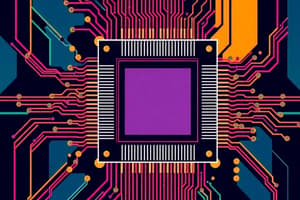Podcast
Questions and Answers
What is the primary role of the CPU in a computer?
What is the primary role of the CPU in a computer?
- To manage hardware components
- To process and execute instructions (correct)
- To transmit data
- To store data
Why is understanding the mechanism of memory crucial for programmers?
Why is understanding the mechanism of memory crucial for programmers?
- Memory controls the overall speed of the computer
- It helps in designing hardware components
- They need to handle data stored in memory for effective programming (correct)
- To understand the physical layout of computer systems
What aspect of the CPU's operation is emphasized for better programming understanding?
What aspect of the CPU's operation is emphasized for better programming understanding?
- The binary information processing aspect (correct)
- The power consumption aspect
- The design of the CPU hardware
- The way it interfaces with peripherals
Which section of the lecture series aims to delve deeper into understanding CPU and memory?
Which section of the lecture series aims to delve deeper into understanding CPU and memory?
What does IAUDIO represent in the context of computer systems?
What does IAUDIO represent in the context of computer systems?
What is highlighted as essential to learn about memory in the lecture?
What is highlighted as essential to learn about memory in the lecture?
What will help in freely programming once understanding of memory is achieved?
What will help in freely programming once understanding of memory is achieved?
What analogy is commonly used for the CPU in a computer?
What analogy is commonly used for the CPU in a computer?
What needs to be visualized for understanding CPU's functioning?
What needs to be visualized for understanding CPU's functioning?
Why is detailed knowledge of the CPU and memory mechanism important before learning coding?
Why is detailed knowledge of the CPU and memory mechanism important before learning coding?
Flashcards are hidden until you start studying
Study Notes
Understanding CPU, Memory, and Input/Output
- CPU (Central Processing Unit) is the most critical component of a computer, responsible for processing data and executing instructions.
- CPU is the "brain" of a computer, but simply understanding its concept is not enough; it's essential to comprehend its internal workings to write effective code.
- CPU processes information using 0s and 1s, and understanding this concept is crucial for programming.
Memory
- Memory is a component of a computer that stores data and instructions.
- Understanding memory is essential for programming, as it's where data is stored and retrieved.
- Knowing how memory works is crucial for a programmer, as it's where data is handled and manipulated.
- Understanding memory requires both physical (hardware) and logical (software) perspectives.
Input/Output and Bus
- Input/Output (I/O) refers to the system that connects a computer to peripheral devices.
- Bus is a system that connects internal devices within a computer.
- Understanding how CPU and memory interact with each other and with peripheral devices is essential for effective communication.
- Learning how devices work together is crucial for understanding computer systems.
Learning Objectives
- The goal of this section is to deepen understanding of CPU, memory, and I/O.
- Focus will be on building a strong foundation of knowledge, step by step, to ensure a comprehensive understanding of computer systems.
Studying That Suits You
Use AI to generate personalized quizzes and flashcards to suit your learning preferences.



